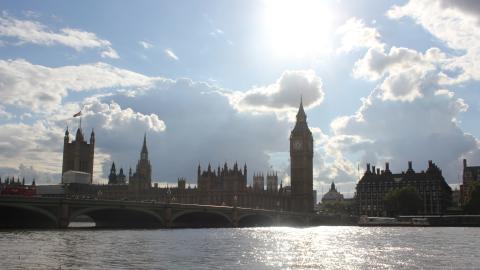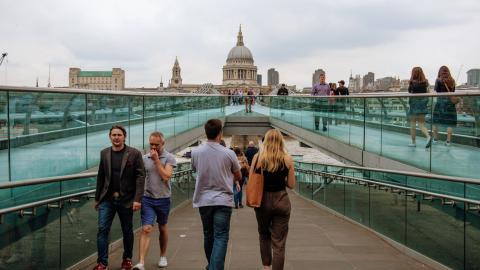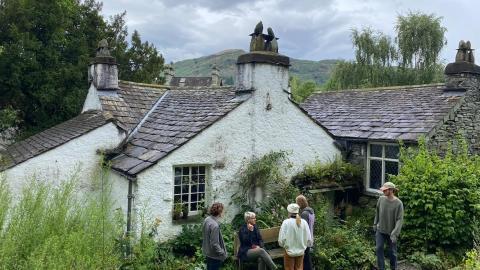Westmont England Semester
Discover the terrain where literature in English was written and plays were performed. This program will aslo explore beyond England to Scotland, Northern Ireland, and the Republic of Ireland. England Semester brings together a community of Westmont students enlivened by new experiences, passionate about language, literature, and performance, and eager to broaden their cultural horizons. Learning on England Semester takes place in the context of pilgrimage—a journey to sites of literary and historical significance that shaped writers of British poetry, prose, and drama. By the end of the semester, expect your relationships to be transformed: with your friends, with the written word, and with God's Word. Come expecting to know and be known anew.
We begin with a week of orientation and theatre-going at the Edinburgh Festival Fringe– the world’s largest performance arts festival. We’ll then continue our thread of drama and dive into literature and culture in earnest as we make our way down to York and then to Oxford. We’ll spend two weeks amongst Oxford’s dreaming spires, at one of the oldest continuous sites of higher education in the world, and we’ll also stay in Cambridge, another center of literary learning and cultural production. We then go to London, where we’ll spend the first of three two-week stints in England’s vibrant capital city, attending plays and visiting sites of literary, cultural, and religious interest. At Stratford-Upon-Avon, we’ll see Shakespeare performed in his hometown, then we’re back in London for another stint, before heading up to Chester–home to Roman ruins and Tudor shopfronts– traversing the top of Wales, and ferrying across the sea to Dublin, Ireland. We’ll pop over to Galway to see Ireland’s green interior and its beautiful west coast, then head up to Northern Ireland for two weeks in Rostrevor to stay at a family-owned set of holiday cottages that have served as a place of learning, rest, and renewal for Westmont students for decades. We’ll close out the semester with a final two weeks in London, digging deeply into this city that remains at the heart of Britain’s literary and dramatic culture.
England Semester is open to any students (regardless of major) interested in studying literature and theatre. Upper- and lower-division English and Theatre Arts credits are offered. See the course descriptions below for how these courses fulfill many of the General Education requirements for all students as well as requirements for English majors and minors, Theatre Studies majors and minors, and Writing minors.
In addition to the general qualifications above, the following are requirements that must be met, with or without reasonable accommodation, in order to complete all essential elements of the program. All participants must be able to:
- Participate in regular communal meals based on a local diet and with limited control over food choices. In some locations, be prepared to participate in preparing and cleaning up after these meals.
- Tolerate local diet with limited control over food choices in most locations.
- Anticipate possible exposure to peanut or other food allergens.
- Navigate multiple irregular surfaces and walk up to 10 miles a day, hike up to 5 miles with the group.
- Participate in rigorous physical activities for the PEA course including, but not limited to: cycling, paddle sports, horseback riding, hiking.
- Be willing and able to travel independently on various forms of public transportation, including international air travel, trains, public buses, and subways.
- Navigate carrying personal items including suitcase and/or backpack without assistance.
- Anticipate having sufficient emotional wellness to fully participate in the program safely and successfully despite the limited availability of frequent access to psychological services.
- Anticipate at least double occupancy accommodations on some if not all locations.
- While not required, it is strongly recommended that you are vaccinated for COVID-19 at least two weeks prior to the commencement of the program.
ENG-165 Topics in World Literature: 21st-Century Anglophone Literatures of Displacement
Taught by Rebecca McNamara (GE Common Inquiries: Thinking Globally and Common Skills: Writing/Speech Intensive; English major: Identity and Anglophone; also counts toward the English minor)
In this transformative course we will read the stories of displaced persons in fiction and non-fiction, poetry and prose, all written in the twenty-first century. Our selected texts are but a tiny sample of the diverse body of world literature by and about refugees and displaced persons. Our temporal scope brings into conversation the medieval past and the present, and our geographical scope will span east, west, north, south. We will think about these texts in terms of issues including, but not limited to: displacement (how is the theme of displacement conveyed, and how is place itself established); voice (who is speaking/telling, are there mediating voices); community (what communities are articulated in the text, what are their functions or effects); identity (how is identity formulated and expressed, does it change); emotions (what emotions are conveyed, how, and what are their effects); exterior and interior (how do characters’ exterior and interior circumstances relate to one another); as well as our own reading experiences as we encounter these stories. In addition to our primary texts, we will read critical perspectives to gain insight into different ways of reading that will allow us to open up these stories with more tools than those in our own toolbox. Our class discussions, the reading responses of your classmates, and the assessments in this course will also help us to interpret these stories via multiple perspectives.
ENG-45 Studies in Classic Literature: Medieval Dream Visions
Taught by Rebecca McNamara (GE Common Inquiries: Reading Imaginative Literature and Common Skills: Writing/Speech Intensive; English major: Pre-1800; also counts toward the English minor and Writing minor)
Visions of resplendent heaven, roadmaps to a more just earth, a city built by and for remarkable women, a friend who can heal life’s worst grief, a journey to find the best stories to tell, birds arguing over the greatest kind of love– welcome to the weird and wonderful world of medieval dreams! In this course, we will closely study texts from medieval England and France in translation to develop critical skills and appreciation for reading imaginative literature in prose and poetry. Our focus will be a specific literary genre: dream visions of late medieval Europe. In the twelfth to the fifteenth centuries in England and France, the dream vision was used to explore ways of knowing God, the world, and fellow humans. Dream visions were often didactic—they aimed to teach something, from the art of love, to how to grieve, to how to tell stories and what stories to tell. Although we’ll be reading literary material, you will develop foundational habits in noticing small details and larger patterns– and making arguments about their significance– that transfer beyond literary studies and far beyond the college classroom.
ENG-117 Shakespeare: Shakespeare’s Medieval Sources
Taught by Rebecca McNamara (GE Common Inquiries: Reading Imaginative Literature and Common Skills: Writing/Speech Intensive; English major: Pre-1800; also counts toward the English minor and Writing minor)
Visions of resplendent heaven, roadmaps to a more just earth, a city built by and for remarkable women, a friend who can heal life’s worst grief, a journey to find the best stories to tell, birds arguing over the greatest kind of love– welcome to the weird and wonderful world of medieval dreams! In this course, we will closely study texts from medieval England and France in translation to develop critical skills and appreciation for reading imaginative literature in prose and poetry. Our focus will be a specific literary genre: dream visions of late medieval Europe. In the twelfth to the fifteenth centuries in England and France, the dream vision was used to explore ways of knowing God, the world, and fellow humans. Dream visions were often didactic—they aimed to teach something, from the art of love, to how to grieve, to how to tell stories and what stories to tell. Although we’ll be reading literary material, you will develop foundational habits in noticing small details and larger patterns– and making arguments about their significance– that transfer beyond literary studies and far beyond the college classroom.
TA-001 Great Literature of the Stage
Taught by John Blondell (GE Common Inquiries: Reading Imaginative Literature and Working Artistically; Theatre Studies major and minor and Theatre in the Liberal Arts major: required core course)
This course studies theatre and drama in one of the theatrical capitals of the world! How Thrilling! The course is built on an essential premise: dramatic literature cannot be fully comprehended without studying the nature of theatrical performance, and theatrical performance cannot be fully understood without an understanding of dramatic writing. This course explores the formal elements of drama; relevant theory and history that deepens our understanding of play texts; staging and acting conventions popular during the periods when these plays were written; and modern and contemporary acting and staging practices that reveal how texts mean now. Play texts will come from plays that we will see in Edinburgh, London, Stratford, Dublin, and elsewhere, and we will construct scenes, exercises, and mini events where we enact the material directly, in many cases using the environments in which our study occurs. Our study will be cultural, as expressions and products of certain times and places; aesthetic, as formal components that make up the individual plays; and practical, as means and methods used in playing these great plays in the theatre.
TA-121 History of the Theatre II: The London Stage
Taught by John Blondell (Theatre Studies major and minor (elective); could count towards the English major as an upper level elective with major substitution)
What is acting? What is an actor? What is good acting? Why? Who says so? What is a character? What is the relationship between actor and character? Who says so? How does one “act?” Is there a technique in acting? What is that technique? Who created that technique? Should an actor experience the feelings that the character experiences? Why? Toward what end? To whose satisfaction? How does the actor’s real body relate to the body of the character? Are there political implications to acting? Who decides upon these implications? Toward what end? What is a director? Where do directors come from? What do they do? How? These questions form the mere tip of the archetypal iceberg when it comes to Acting and Directing. In London, those questions have been asked and answered differently over the centuries. We have the rich and rare opportunity to ask them in the spaces where they were first asked – in churches, manor houses, inns, playhouses, and yes, eventually theatres. We will also explore answers to them in museums and libraries, and answer them for ourselves in individual and group projects. This course helps sensitize students to the nuances that shape acting process, method, and presentation, and develops critical thinking skills necessary for an aware, nuanced perspective important to the acting of the past as well as the present, all growing out of London as site and location for our study. How Exciting!
PEA-094 Adventuring in Literary Landscapes
Co-taught by John Bondell and Rebecca McNamara (GE Common Skills: Physical Education)
This course is designed to help you stay active while we explore a range of landscapes and urban spaces, and it will encourage you to take up opportunities for both indoor and outdoor activities in the places that we visit. These rural and urban areas will often be ones where writers in our syllabi walked, worked, and lived, or they might have served as the inspirations for the fictional worlds that we’ll encounter in the texts we read and plays we see. This course will give us practice in exploring new urban and rural spaces, in minimizing our impact on resources, and in discovering how some forms of exercise can help relieve the personal stress of cross-cultural travel, all the while better acquainting us with the contexts that shaped writers and stories on our syllabi.
London
One of the world's great cities, London offers up an extraordinarily diverse array of people and experiences. Jostle with the groundlings at Shakespeare's Globe, consider the complicated legacy of imperialism in the treasures of the British Museum, or trace many of the routes of Dickensian characters through the city he loved.
Dublin
The Republic of Ireland's capital city. We will walk in the footsteps of poets from W.B. Yeats to Eavan Boland, and consider the complicated history of the connections between Ireland and the UK in the light of postcolonial questions of literature and culture.
Rostrevor, Northern Ireland
In this bucolic setting dotted by small cottages, we will breathe in the air of the Irish countryside and learn more about Ireland's Catholic heritage and the work of religious reconciliation. We’ll hear music (and maybe make it), listen to Irish storytelling, pray together with Irish Christians, and travel throughout the island from our cottage homes.
Westmont tuition, room and board, program fee, and round trip airfare. The program cost covers transportation within the British Isles, housing, food, theatre tickets, select admission fees, guest lectures, Q&A sessions with actors, directors, and designers, and other group expenses.
Students are allowed to apply their financial aid awards from the college—both need-based and merit-based awards—toward the program’s cost.
- Class standing
- GPA (minimum 2.3 gpa for eligibility)
- Application and essays
- Personal and faculty recommendations
- Leadership experience
Meet the Team
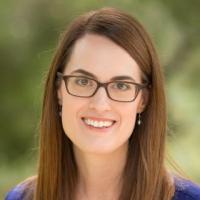
Dr.McNamara has studied, researched, and taught medieval literature around the globe, from Waco to Oxford and Sydney to Los Angeles. After a decade abroad in England and Australia, this native Texan is delighted to join the English Faculty at Westmont and to make Southern California home.
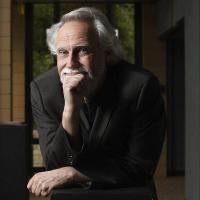
John Blondell is Professor of Theatre Arts, Global Ambassador for the Performing Arts, and Co-Chair of the Theatre Arts Department at Westmont College in Santa Barbara, California; Founding Artistic Director of the Lit Moon Theatre Company and its international extension Lit Moon World; Director of the Lit Moon World Theater Festivals; and Co-founder of the Verona Shakespeare Fringe Festival.




